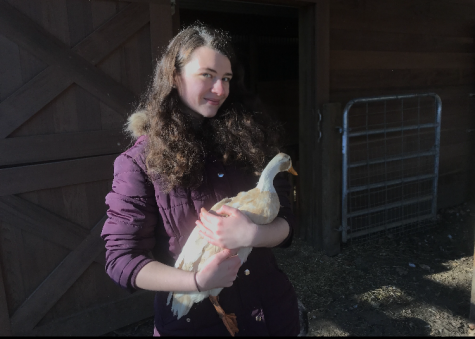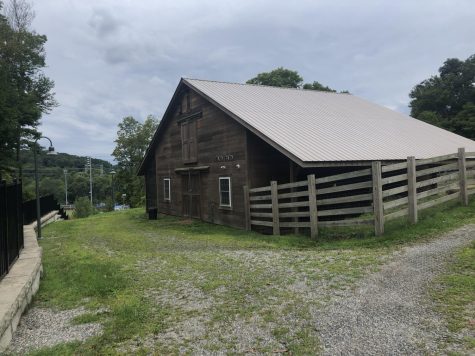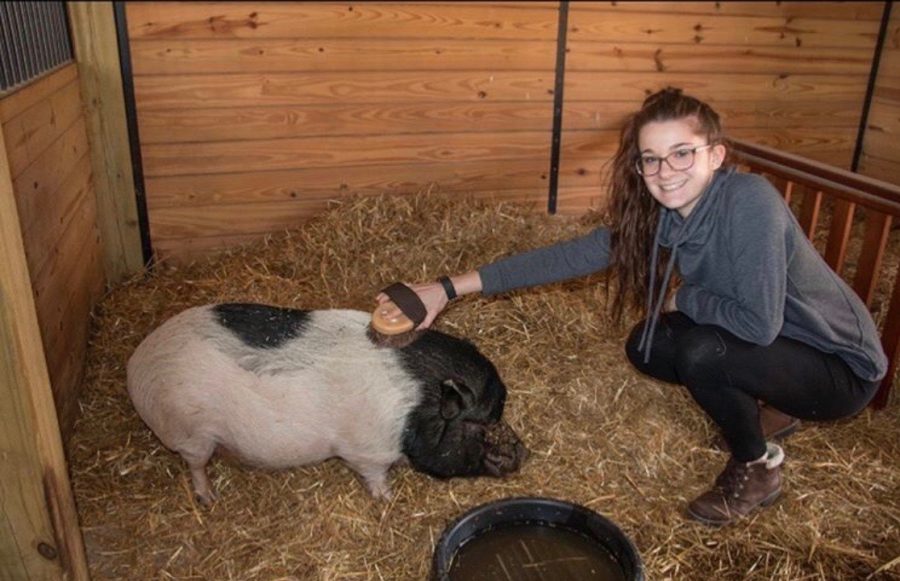Students push for the animals to remain; Pace reflects on farm impact
Taylor Ganis, student keeper and president of the nature club, has been vocal about saving the animals on social media.
GoFundMe’s, social media pages, petitions, mask fundraising etc.. have all been created by students over the past few weeks. These platforms are a reaction to the announcement that Pace is planning on getting rid of the animals located at the farm, as well as the animal keeper James Eyring at the end of the Fall semester.
Eyring, Assistant Director of Nature Center, is in his 40th year at Pace. However, Pace is letting him him along with the animals in December.
Eyring says he was shocked by his unemployment.
“I’m proud of my time here at Pace and I couldn’t have worked any harder. In the last 40 years, I know where I spent every Christmas, Thanksgiving, New Year’s Day,” stated the Assistant Director. Even throughout the COVID-19 global pandemic, he was on campus taking care of the animals daily.
The farm was originally established in the 1750’s, but changed hands multiple times before it ended up with the Choates.
The farm has a rich history at Pace and used to be located in the center of campus, but was relocated when Alumni and Elm were built.
Eyring says there has always been talks about eliminating the campus farm, even prior to his employment at Pace, but when the new masterplan 6 years ago incorporated the new nature center and farm. He alongside others had thought “We’ve arrived.”
There had been a gradual decrease of funding for the farm and elimination of animals like getting rid of the horses that were originally there.
The farm, which is in the back corner of the Pleasantville campus plays a role educationally, mentally and physically in the lives of Pace students. Members of the Nature Club located on campus are advocating for the animals to stay and working towards creating compromise with university leaders.
Taylor Ganis, President of Nature Club and an Animal Keeper on campus, stated she was heartbroken after seeing an email that was sent to all animal keepers regarding the elimination of the animals. Within 5 minutes, she immediately began a petition and within the next 24 hours they started a gofundme to raise money for the animals.
Transfer student, Raymonda Martin, stated the important role the farm had in her decision to attend the university. “Our boss James was here, and talking with him, I knew I needed to come here. I got hired to work at the farm before I even picked my classes. I enjoyed it so much and learned so much from experience with the animals.”
Senior Alexandria Porter is on a Pre-Vet track and used the opportunity to work with animals to benefit her future career goals.
“ The reason I chose Pace was because of the animal center and birds of prey. I started off volunteering at the farm and eventually a job opened up. Working with birds of prey is unique and helps enhance my chances (of getting into vet school). No other college has this opportunity.” .

In addition, Eyring stated the farm received a lot of volunteers, not only from those in the environmental majors on-campus, but those who needed volunteers hours for their civic engagement class.
Porter’s plan is to convey to university officials the benefits of having the farm. She, alongside other members (Martin and Ganis included) met with officials to present to them how they could benefit their enrollment by maintaining and promoting the farm. They put together proposals to create a compromise with their plans.
One of these proposal plans was to attract more pre-vet students by advertising the birds of prey and farm animal experience they can get during their undergraduate years. Porter says that birds of prey are extremely rare and unique which would give students an advantage when applying to vet school.
Moreover, the group also proposed that they would comprise the amount of animals at the farm, utilize the fundraised money and have Nature Club have a larger part in the running of the farm. The Nature Club receives SGA funding because of its club status. They would utilize some of their SGA funding, which is from the student activities fee Pace students pay, to assist with the financial aspect of having a farm on campus.
Despite the importance of the farm to environmental majors at Pace, it plays a larger role in the Pace and Pleasantville community. Martin and Porter completed a demonstration at the Pleasantville Farmers Market, where they explained that many people came over to them and talked about bringing their kids or walking their dogs through the farm.
Eyring exclaimed that the farm brought connectivity as the town had always been supportive of the nature center. Furthermore, the center would often put on programs for Pleasantville for Earth Month. They also frequently held special Birds of Prey events.
“To lose James in itself is a demetrial loss. He has shaped my career and I think he’s shaped so many others. To lose him, is a huge loss for the university,” exclaimed Porter.
Eyring reminisced on how Pace plays a large role in his life.
“Almost all of my life milestones have been here at Pace; I got engaged here, got married here, and brought my daughter here at 6 days old,” stated Eyring.
Moreover, Eyring’s fondest memories throughout his 40 years at the university revolve around the students he had the opportunity to help shape. He explained that he had his daughter late in life and always used to refer to the students he worked with as his kids.
“College students were my kids, I poured my heart and soul into them and my knowledge into them,” he expressed.
Eyring says he worked with many of his students for multiple years. He recalled about 35 of them that he spent a great deal of time with and is still in touch with all of them today.
The farm has caused an outcry amongst Pace students on social media, and is reflected in the $4,445 dollars raised via GofundMe. Moreover, the petition has received 2,406 signatures. The amount of support lead the group to begin a new instagram page, @Save_paceu_animals, where they can continue to advocate and update others on the farm.
Pace is planning on turning the farm area into an ecological system, as they believe the current farm is not utilizing the space to best benefit the academic goals of the students. Pace released in a statement to The Pace Chronicle, “Our goal is to provide Pace University students with the experiential learning they need to succeed in their careers. After a thorough analysis, the Nature Center in Westchester is being converted to a living laboratory with flora only. This better supports our academic programs, provides the strongest options for programming based on student interest and career opportunities, will save on costs and is similar to farms at other colleges. We are committed to the safety and wellbeing of our animals and they will be placed in new homes with other organizations in the region by the end of the year. This was a difficult decision and the animals will be missed.”
Ganis, Martin and Porter are not opposed to adding on components of the ecological fields to the space, but want university officials to recognize the importance the farm has played in their academic and professional careers.
This farm provided a uniqueness to Pace, stated the group.
“It’s an escape from city and suburban, and school life and it’s a hidden gem that they haven’t used to their advantage. They have forgotten about it and pushed to the side..” exclaimed Ganis .
Porter echoed that, “You haven’t put as much value in it and that is why your losing something so great.”
The Assistant Director of Nature Center, described many of the courses the farm could have been utilized in. He mentioned Animals in Society, the talks of Pre-Vet programs and that the university is No.1 in the country for Environmental Law. However, he states the nature/environmental center had always been told no and the under usage of the farm for academic purposes was of no fault of the nature center staff.
“I honestly believe that it was underutilized,” stated Eyring.
Pace is looking for these new areas to increase the amount of inquiry-based experiential learning and use the field stations for research, as well as teaching spaces. In an email to all students from the Dean of Dyson, it was stated that the trails and gardens located in the nature center would remain.
“The farm animals and birds in the nature center will be placed in well-respected organizations throughout the region,” according to the email by Tresmaine R. Grimes, Dean of Dyson.
Eyring said he is diligently working to find all the animals a home, “I’m going to make sure I see the facilities the birds are going to.”
He explained that their new home situations may not be as great as they were at Pace. Since, the university far exceeded federal and state guidelines. However, he would ensure that they will be well taken care of. Furthermore, he is preparing his home to take some animals in as many are disabled for life. The majority of birds of prey were brought to Pace through his falconry license.
He mentioned that he has already found a home for one bird and is in the process of having a place for three others.
The farm’s legacy will remain in-tact at Pace for the students, staff, faculty and members of Pleasantville that had the opportunity to view it.
“I always thought it was the heart of Pace U. I always though it was the unique thing, especially when we were in the center of campus.” exclaimed Eyring.
The support from the Pace community through the various campaign efforts has been overwhelming for Ganis,
“I cried because it is cool to see what we are doing makes more of an impact than we thought,” exclaimed Ganis.

Your donation supports independent, student-run journalism at Pace University. Support the Pace Chronicle to help cover publishing costs.

